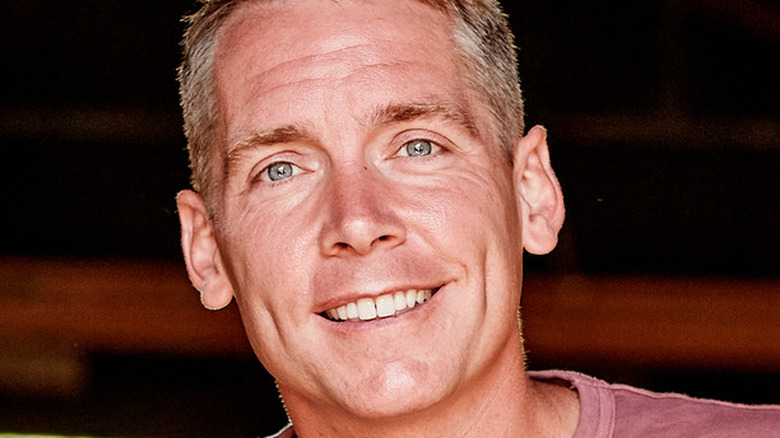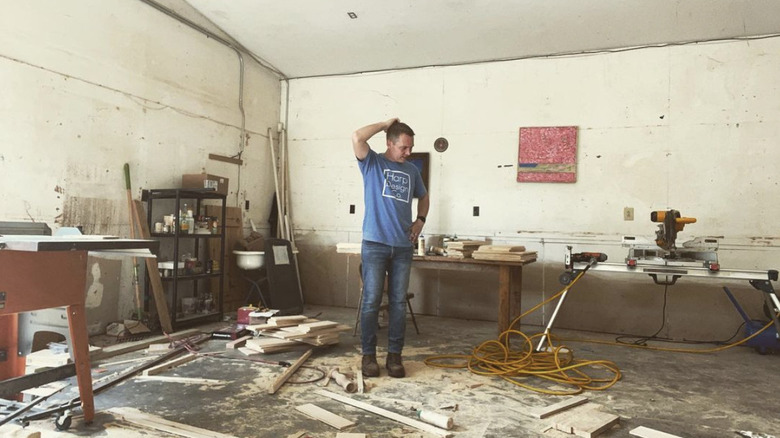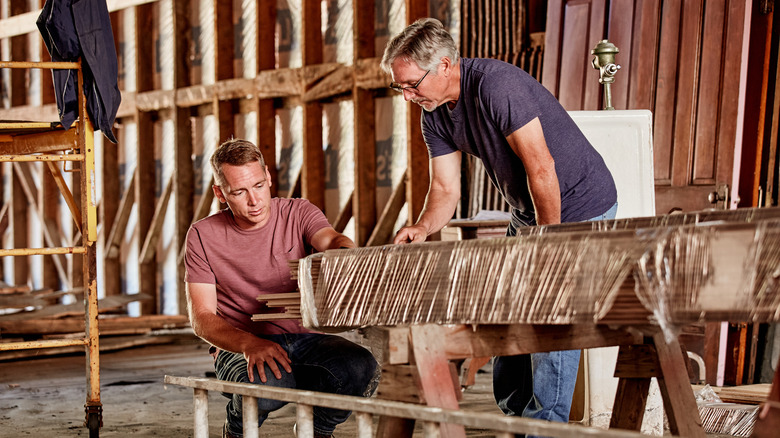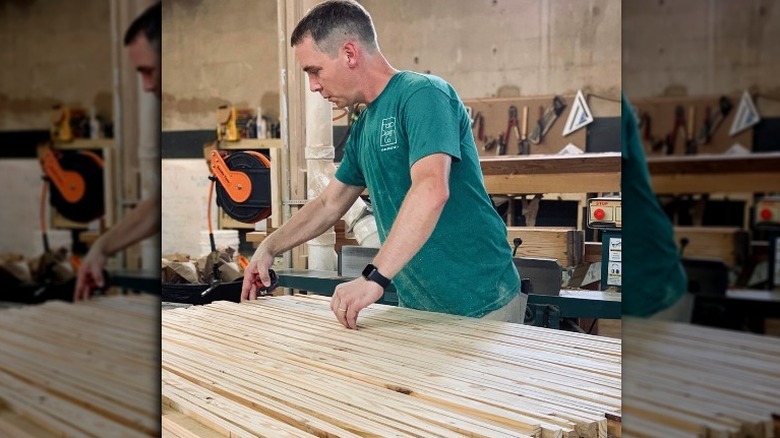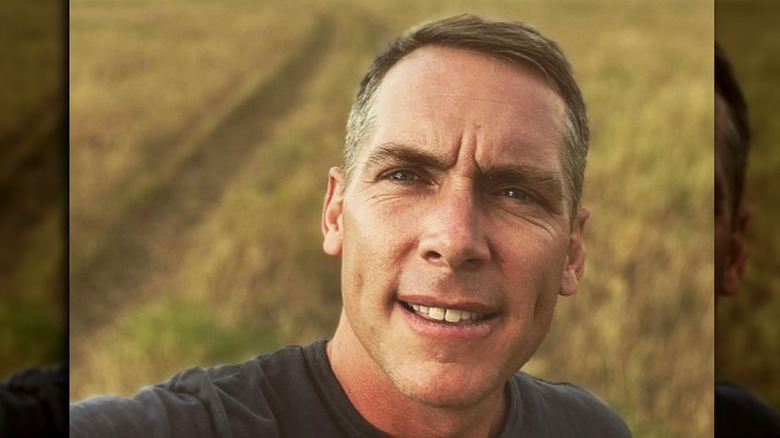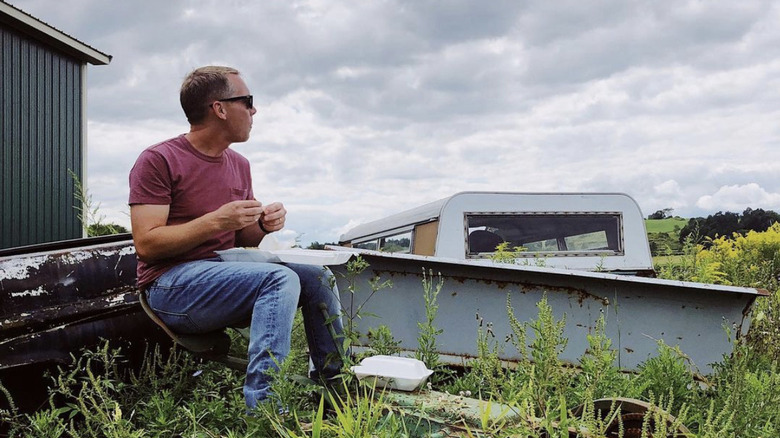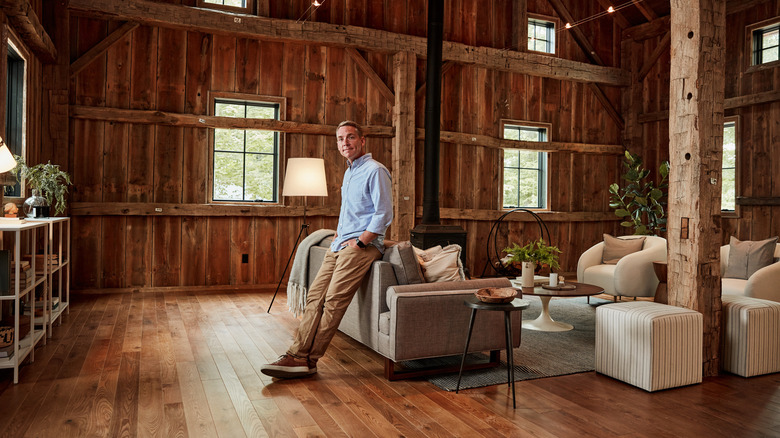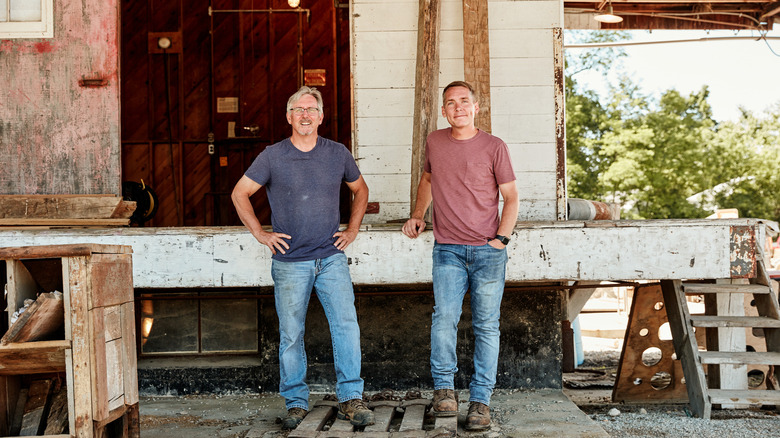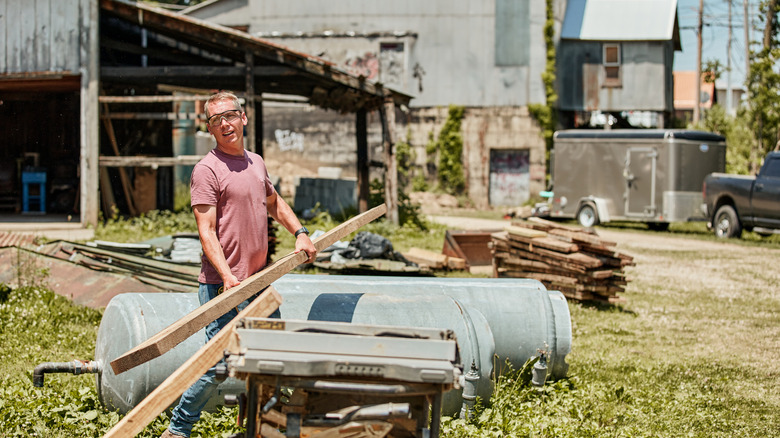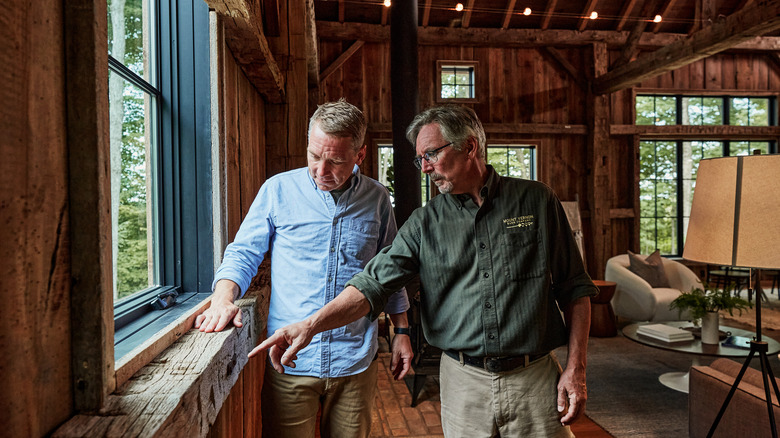Clint Harp Talks His New Magnolia Show Restoration Road - Exclusive Interview
In the early days of a little HGTV show called "Fixer Upper," there was construction guy Chip Gaines, designer Joanna Gaines, and carpenter Clint Harp. The trio was joined by on-camera construction crews and movers, but they made up the heartbeat of a show that was just getting its footing. Of course, what started as a small home improvement show located in Waco, Texas turned into a magnificent, attention-grabbing empire, and Chip and Joanna quickly became the couple behind the Magnolia empire.
Harp, who has focused on carpentry and woodworking in a variety of forms (avid viewers will remember when he gave Joanna a candlestick-turning lesson), has been with the couple since the very beginning. But when "Fixer Upper" ended its run on HGTV at what seemed like the height of its success, a number of viewers wondered what would happen to Harp. Well, wonder no more — the carpenter has (partially) traded in his woodworking shop for a cross-country tour, working to restore historic buildings across the United States. The show? "Restoration Road." The network? Magnolia Network. We sat down with Harp to get all the details about his show and his journey with the Gaines family, and have all the answers you're dying to know.
What attracted Clint Harp to Restoration Road?
First and foremost, I want to talk to you about "Restoration Road" and what attracted you to that kind of project in the first place because it's a bit of a deviation from what I think fans and viewers have seen you do in the past.
For sure. Yeah. Well, you can imagine getting the phone call, first of all, over two years ago now saying, "Hey. Chip and Jo, they got the new network, and they want to make a show with you, and the idea is to take old stuff and make it into new." Hey, perfect. That's me taking old wood, wood that's been thrown away or is going to be thrown away or burned or whatever, and transforming it into something new. That's right up my alley. There wasn't much more meat on the bone as it were in terms of an idea and a concept beyond that. It just began to grow from there, and it turned into, "Hey, we want to do a bunch of work with a bunch of old barns and old wood and old structures." As it evolved, that's what it's really turned into.
For me, that's amazing. It's a dream to be able to do that because I love building furniture, but I love old structures. I've said it on the show many times that I'll be at a museum somewhere with my family on vacation. We'll go to the Louvre, or we'll go somewhere, the Biltmore House in Asheville, North Carolina, and I hate having to stand on this side of the red velvet rope. I want to go back in there. I want to dig around and really explore the structure. That's always been me. Always. For as long as I can remember. I hate not being able to get all into that old thing and explore and go on an adventure.
Well, this show, I'm behind the velvet rope. There's no one there saying you can't go there. Its like let's dig into this old barn, this old cabin, this old train car, whatever, and let's imagine what it used to be. Let's imagine how they built this or whatever. For me, it's a dream come true. I love it.
This is what stands out to Clint Harp from his time working on Restoration Road
Is there a particular restoration that's part of the show that you've done so far, that's really stood out to you?
Oh, gosh. Man, there are so many that we've done that they're all really and truly ... They're amazing in their own right. I have to tell a story that you can really visualize. Some of them you just have to imagine and whatnot, which I love as well, but there've been a few where it's like you can see what was going on in the late 1700s or 1800s when this family moved here and set this thing up or whatever.
For instance, one in New York, we took it down. This old barn. It's beautiful. I wish I could have it as my own home. It's just gorgeous. Basically, when you're on the property, you can literally see how a family moved there. The Erie Canal was being built, and so they were thinking we're going to move there. Mom and a dad, they were like, "We're going to take our kids, and we're going to start a dairy farm. We're going to buy this property. We're going to start a dairy farm, just 200 yards from the Erie Canal, so we're going to raise mules, and we'll rent the mules out to the canal so that the mules can tug the boats along through the canal." Then you can see where they'd sit. Through the years, they're like, "Oh, let's put a grains bowl up here." Then they were like, "Oh, let's make a milk refrigerator over here."
Then you got to the Industrial Revolution and you can see where they started to have actual mechanical equipment, and one of the guys I was shooting with, he loves history. He was talking about how, in that moment, you can then see where this family ... had this self-sustaining farm. This self-sustaining business. Everything was right there. They made their own stuff. They were connected to their little community in town, but that was it. Well, now all of a sudden you get these tractors and big machines, and now they're connected to the global economy. Oil, gasoline, metal. Tires, and all this different stuff. Now you're connected beyond and so you can see the evolution of this family that came there with a small dream, and then they just grew.
Yeah, absolutely.
It was really neat to stand there and just take all that in, and so hopefully viewers will be able to pick up on that when they see the episode.
Clint Harp was taken out of his comfort zone for his new Magnolia Network show
We touched upon it a little bit, but obviously viewers have seen you in a carpenter's role for a while. In what ways do you think the show really challenged you or took you out of your comfort zone?
Yeah. Well, so a few times I get to jump into the shop in the show and make a table, or make a windmill or a water wheel or whatever. A few times I'm in my comfort zone and I get to do that, but for the rest of the show, yeah, I'm out there learning about these giant structures and how they were put together. The first episode that people have seen was about a train car.
That's amazing.
I don't know anything about train cars. Yeah, so I ... What I've learned, though, is that if I make my comfort zone learning, being a student, then everything works. I just take them in. I'm not out there to be the expert. I'm not the expert. Of course, I'm learning as I go and building a bank of knowledge as I go, but my new comfort zone in this show is being the student and taking all this in, and then hopefully communicating that to the audience that's watching it, and they can learn right alongside me because there's some amazing people out there doing some amazing work and these men and women that I've gotten to work with and talk with and learn from, it's really been special. Hopefully that will transmit through the television.
In this new role, did you learn about new aspects of yourself in amongst all of this experience? It sounds like you've really embraced this new "let me be taught" mentality.
Yeah. That's a great question. I think for sure. I've always known that I love adventure. Like I said, I've always known I want to go in the places where you're not allowed to go and explore and spur, but I've really learned how much I actually really am like that. I thought I was like that, but this just confirmed that for sure.
Restoration Road served as a history lesson for Clint Harp
[On what he learned while filming "Restoration Road"]
I think the other parts I'm learning about are the parts that I didn't know because I wasn't taught things about our history. Talking to these four or five old gentlemen up in Ohio that have this coffee club every Saturday morning or something like that, and I got to sit in on their coffee club and learning about American history through their eyes. You might look at those men and have an assumption of how they think about things, and then you'd be proven totally wrong, and you'll learn about like, oh wow, this is so mind-blowing. Then you go down to Dublin, Georgia. Then I get to sit down with this woman who used to work with Martin Luther King Jr.
Wow.
Yeah, and has personal stories of working alongside him and with his team and learning about American history through her eyes. Of course, also just learning about American history through these structures and how they were built. The resourcefulness. Also, some of the wastefulness of the early Americans. I've talked about this a ton that you have this amazing collection of virgin hardwoods that just littered the entire country, basically. The Eastern Seaboard was just this massive collection of old-growth hardwoods, and they were all cut down for the purposes of even the British back across the pond. We were shipping wood from here back over there because they ran out of wood over on their little island.
There's a lot to learn, so that's one of the reasons why it's so important that we save these structures is because when they're gone, they're literally gone. We can never grow that wood. We can't grow it again. You're talking about wood that was grown over four, five, 600 years, and then it was cut down and hand hewn into these massive beams and formed into these structures. Then they sat there for another 200 years, so you're talking about wood that is five, six, 700 years old. We're not going to get that again.
It's really fun to save these structures, and sometimes they're cool old ancient wood, and sometimes they're a train car or whatever it might be. Regardless, it's a part of our history and that history, whether it be good or not so good or complicated, is all part of the show and what we're trying to untangle and learn from, and I hope people really enjoy it.
This is what Clint Harp's early days with Chip and Joanna Gaines were like
I want to shift a little bit back. You've been with Chip and Jo for quite a while. Their launch of this network is obviously such a huge step for them, so I'd love to know what's been one of the more gratifying parts about being involved with them and growing with them throughout this journey.
Yeah, for sure. Well, I can remember the days of sitting in my shop and Chip and Jo came over one day. Kelly was there with me, and they had their kids, and we had our kids, and I think Chip picked up some sandwiches from our local sandwich shop here that we all love, Schmaltz's, and we were sitting there in my shop and in the back, the garage door was open, and we were just looking out to the back of my shop and this grassy field. Wasn't very nice. We were just quiet. The kids were playing and eating and whatever and the four of us were just sort of sitting there, and it was kind of like, "Okay, I guess we're all going for it here."
They were going forward in their own way. I had quit my job in Houston and decided with Kelly to do that, and we had decided to start our own business. Of course, we had no idea how that was going to work out. We didn't even know where we were going to move. Then when we moved to Waco, because Kelly's going to get her master's degree, and she gets an opportunity at Baylor, we're not even thinking about television. I don't even have a shop yet. Fast-forward to me sitting on the floor there with Chip and Jo and Kelly, and we're eating sandwiches and "Fixer Upper" is not even really a thing yet and then next thing you know, it is a thing and that blows up.
For me, to be a part of this journey with them all the way back to those days is so super special because so many people will just get introduced to Chip and Jo or to me when they already have a network or when they have a show or when I have a show and whatnot, but the reality is, is that we're just people who all of us were just trying to go for a dream and do things that we love and the next thing you know, it turned into what it is today, and the fact that they have chosen, and I do mean that, they have chosen, they didn't have to keep calling me, that they've chosen to continue to make me a part and appreciated the hard work that I've tried to put into all of this, it means the world, and I'll always be grateful. And I'll always just work as hard as I can to make this show and all the projects that I'm a part of with them [the] best ... they can be.
What episode of Fixer Upper stands out the most to Clint Harp?
Is there a project or an episode of "Fixer Upper" that stood out to you, or you look back on a little bit more fondly?
Well, yeah, it had to be mine.
I remember that episode.
Yeah. That one, first season. Those were in the days where the line had not formed yet for people that wanted to be on the show. That was Season 1 and people were still trying to figure out what this whole thing was and there's camera crews all around town and what's going on. I think they had a 13-episode order for Season 1, 12 or 13, something like that, and they were a few episodes short because they didn't have the projects.
Joanna runs into Kelly one day in a parking lot outside Target, and we had just bought this crack house, literally. It was just a dumpster fire of a house, and we had just bought it from the owners for $10,000, which we didn't have, but a bank was kind enough to loan me, and Joanna was like, "What are you all going to do?" She was like, "Well, we're going to clean it up because our shop's right next door to it, and we just want to make it presentable so that cleans the neighborhood up and people aren't afraid to come to our shop," and all this stuff. Joanna was like, "Let's do it for the show." Then the rest is history.
That one will always stand out. There's other projects too, that ... Jo was always really good to just let me run with it, and there were so many projects like that. There was one that really stood out where I had this old wood behind the shop and I said, look I ... and I don't want to put any stain, varnish, poly, anything on it, and it's going to be really cool. She was like, "All right. Do your thing." She's Joanna Gaines. She's freaking designer extraordinaire. She's one of the best in the entire world. She is incredible, and for her to look at me and go, "I trust you. Do it. You do your thing." Like, wow. Okay. Thank you so much. Yeah. Those are such special memories, and we're just continuing to make more.
Did Clint Harp ever expect his career to evolve like it has?
I know you're pressed for time, so we'll wrap up in a little bit. I have a couple more questions. I have so many that I want to ask. I know that you left a job in the medical field to pursue this passion. I guess now, in retrospect, looking back, did you ever expect your career to grow like it has?
Well, no. When I stepped away from the medical field and the sales world, it was me realizing that was not my thing. That was not for me. In the sales world also, what are you doing when you're in sales? Well, you're putting yourself out front. You're presenting to people. You're speaking. You're the main attraction, and you're trying to get people to jump on board with you.
Before that, before I was doing sales, I was a musician and I sang and played the guitar, and I was in plays. I was even in a short film. I loved being on stage, and the sales world was another stage. There was a part of me that at that point, I was like, "You know what, I'm going to just disappear," and going into the garage with the blessing of my wife. Quit my job. She and I both decided this is where we're going. When I stepped into that garage, that was my way of saying goodbye to the world for a little bit. I was like, "I'm just going to disappear for a while and just sweat inside this shop and build stuff." Because I think there was a part of me that needed to go away and just be creative and try something new and try something that really that I was actually passionate about, and I did that.
Then we moved to Waco and I actually volunteered with Habitat for Humanity for a few months.
Oh, very cool.
Yeah. Again, that was just a great opportunity for me to just do something that ... I wasn't performing. No one had to look at what I was doing. I was just doing what I really wanted to do.
Then the next thing you know, I get this crazy opportunity because I meet this guy at a gas station and months later after meeting him, I'm building furniture for his wife. Then months after that, I'm a part of the pilot that they're filming for HGTV. I find myself back in a world that I do love. I do love being in front of people. I do love telling a story, and I've gotten an opportunity to go around the country and speak and things like that. I love doing that.
I think when I got the opportunity, the second time, this time around with Chip and Jo, I think I felt more whole. I think I felt more like who I actually am as a person, because I had just had some time to step away from it all and decompress and let a lot of life's lessons sink in that I've been learning over the years. Then you come out on the other side, and you're like, "Okay, yeah. Let's do this. Let's get on this train and see how far it goes."
These are the behind-the-scenes secrets that Clint Harp shared about Restoration Road
Okay. Last question and then I will let you go. Did anything happen on your new show that viewers don't get to see? Any behind-the-scenes details that you can spill would be much appreciated.
This is a really boring one, but my spine was falling apart in the first season. Not really, but I had a bulging disc or something. I don't know. There are some scenes in that first season where I'm banging stuff together with these giant hammers. They're oftentimes called beetles. You don't remember this, you may not, but the old comedian Gallagher, the guy that used to have the big stump and the –
I believe so.
He put like watermelons on there, and he took the giant wooden mallet and yeah. Anyways, that's like what we're using to bang these barns together and knock in a lot of this wood and stuff. There's episodes where it's really cold, and I'm up there. I'm bundled up, and I'm hitting this wood together and every time I'm hitting it, I'm just like ... There's so much pain. I don't know. Thankfully it's fine now already thanks to awesome folks and got it taken care of. Everything's good now, but yeah, there were some moments where it was just like, "Golly, I am in so much pain."
One thing that it's a unique thing about our show. I can't tell you how many times we've gotten drones stuck in trees. It's like an episode is not complete if we don't get a drone stuck in a tree, and we've had camera guys climbing trees with climbing gear to get stuff out and fire departments with ladders to get drones out.
People will see it a couple times. I don't know how much they'll see it, but I've gotten an opportunity to go around the country and eat so much amazing food. We try and put it into the episodes, but I tell you that's been a real treat that, again, people just know me as the guy that I build stuff and carpenter. I love old wood and all that, but I also love food, and good grief, when you travel around, you get to taste new flavors and that's been really super fun.
This is how Clint Harp found out about his new show on the Magnolia Network
I'll tell you one quick story, and this'll be a nice little behind-the-scenes story for you.
Perfect.
When the first phone call, Sarah Kuban, she works at the network, she texted me. She had been an executive over at some other show that I had done for the networks and pilots, and she called. It was May of 2019. I knew that the shows that I'd worked on before were not going to happen and Chip and Jo, I knew they had started this new network. I didn't know what was going to happen at that point. I was starting to throw some ideas around in my own head. Well, maybe I could go and do this. I was coming up with some of my own ideas, and I get this text from Sarah, and she says, "Hey, Clint, you have time to talk next week? Chip and Jo, they want to do a new show with you on the new network." I'm like, "Yeah, of course."
Well, the next week was my son's sixth grade class trip, and I was one of the chaperones on it. The phone call was scheduled for the Thursday at the end of the week, and we were out in the middle of nowhere. We were at [a] little camp with this school, and we drove out there, and I had a phone call scheduled with Sarah and then Allison Page, the president of the network. I'm at camp all week and, of course, I'm looking forward to Thursday because I'm like, "I want to hear what is this? What's this idea? I want to know more. I don't know anything. I just know that Chip and Jo want to do something with me."
Thursday comes, and I get in my car and I drive and there's no signal. Of course, I've got this phone call. I had left with enough time to get to the town, but I thought I took a wrong turn and I didn't know where I was, and I had no signal for my map thing to work. It's panic mode.
Oh, no.
I'm like, "No. I've got to get this phone call." Anyways, I finally find a place. There was a old fire station or something and I parked in the parking lot and I found one bar.
Oh my God.
I had one bar and I call Sarah. Thankfully, Allison had been talking with some big wigs up at the network and whatnot, and so she had to be a few minutes late. I just sat there with Sarah for a few minutes, and we talked about some of the old pilots that we had done together. Then the next thing you know, Allison gets on, and she tells me, "Hey, this is what Chip and Jo want to do. They want to make a show about old structures being turned from old to new and right now the working title is 'Old and New,' actually. That's what we're calling it." That all just happened to me sitting in my truck in the abandoned parking lot of this fire station with one [bar] on my phone, and I'm just going, "Yes, great. This is fantastic."
Everything that could've gone wrong. Talk about panic central. Oh my God.
Yes, totally. Absolutely.
Magnolia Network's slate of original programming launches July 15 on discovery+ and inside the Magnolia app.
